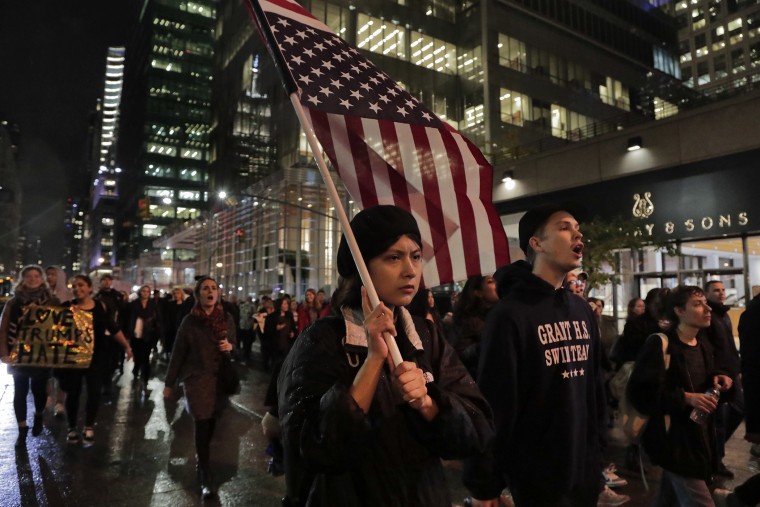Eight years ago, in a variety of cities across the country, many Americans poured into the streets in spontaneous celebration, cheering then-President-elect Barack Obama's victory. Eight years later, there were once again Americans in the streets, but as Rachel noted on last night's show, their message was very different.
That's really just a sampling. As Rachel noted on the show, we also saw protests at various times yesterday in D.C., Seattle, Portland, Boston, Philadelphia, Pittsburgh, Austin, Tempe, Nashville, and San Jose. In Los Angeles, anti-Trump protesters even shut down a highway.I should note that such widespread protests are not common in modern American history in response to a presidential election.Complaining about the protesters, Rudy Giuliani, among a variety of conservatives with concerns, told Fox News, "The reality is they're a bunch of spoiled crybabies."Or maybe they're Americans practicing their rights to peaceably assemble, expressing their opposition to the election of a bigoted demagogue to the White House. I suppose it's a matter of perspective.It'll be interesting to see if these protests continue, whether or not their numbers grow, and what shape they may take. As regular readers know, I've had more than a few concerns about the Tea Party "movement," but as misguided as the far-right activists were, it was easy to respect one thing about their efforts: they got up off the couch.These conservatives may have been confused, but they had some core convictions: they hated the president; they hated the idea of public officials expanding access to health security; and they hated taxes. From there, these same activists decided to get organized, hold rallies, and make their voices heard.I'll concede that those voices didn't have much to say that was rooted in reality, but that's not the point. The important thing, in principle, is that they took their beliefs seriously enough to get involved in political activism. What's more, it had an effect: the year after Tea Partiers took to the streets, they created a right-wing wave that handed House control to Republicans, effectively halting the federal legislative process for six years.Substantively, the consequences of their work were awful for the country, but that doesn't change the fact that we're talking about a group of Americans who set out to make a difference and did exactly that.If the anti-Trump protests continue, might we see the seeds of a progressive counterbalance as a result of the 2016 elections?
